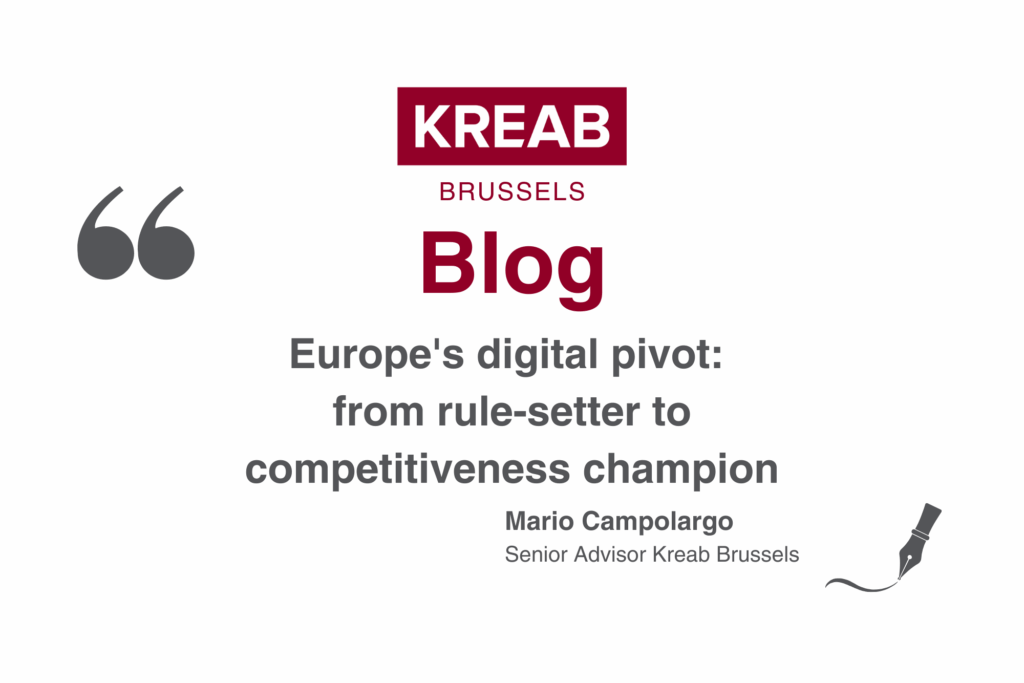
12/11/2025
Europe’s digital pivot: from rule-setter to competitiveness champion
By Mario Campolargo, Senior Advisor at Kreab Worldwide, former Secretary of State for Digitalisation and Administrative Modernisation of Portugal and Director-General in the European Commission
EU Digital and technology policy has seen substantial production of regulation over the past few years, building on the General Data Protection Regulation (GDPR) and seeking to further solidify its role as a global rule-setter through the Digital Services Act (DSA), Digital Markets Act (DMA), and more recently the AI Act, to name the most prominent.
Yet, since the 2024 elections, a noticeable shift has taken place. Facing escalating geopolitical tensions and growing global competition, the EU’s focus is moving from rule-setting to industrial capacity and capability building. The new emphasis is on strengthening technological sovereignty, security, and competitiveness. How can we achieve this and preserve the core values of the Union.
This is not a rejection of earlier priorities. Nor is it a u-turn, but rather a necessary pivot, a natural evolution, a maturing of the European digital strategy. The human-centric ethos remains, but it is now complemented by a geopolitical and industrial imperative. This reorientation is visible across EU policymaking. The drive for simplification and streamlining of existing rules reflects a recognition that simpler regulation reduces market friction and promotes a clearer pro-competitiveness strategy.
The forthcoming Digital Omnibus, to be presented by the European Commission on 19 November, will mark a major milestone in this context. Part of a broader digital package, it aims to rationalise and align EU rules on data and cybersecurity, providing a glimpse of how far the Commission is prepared to go in revisiting its earlier regulatory approach in the name of competitiveness, particularly as there will be a broader assessment of the entire EU digital acquis in 2026.
At the same time, Europe’s quest for renewed competitiveness inevitably relates to the digital economy and its technological infrastructure. The forthcoming Digital Networks Act holds promise of revamping telecommunication rules, harmonizing national practices, protecting submarine cables, accelerating deployment of fibre and looking at cost sharing alternatives to boost the deployment of cutting-edge secure capacity. This infrastructure is vital if we want to become an ‘AI Continent,’ as the European Commission has declared. The announced Cloud and AI Development Act, set to land in March 2026, is meant to stimulate further development of AI and cloud infrastructure on European soil by making sovereign cloud infrastructure more interoperable and secure across Europe, promoting a competitive internal market fostering a vibrant data economy. Alongside these proposals, the Quantum Act (to boost quantum R&D and deployment where the EU has significant assets), the new Chips Act (to further increase European semiconductor production capacity), and the Innovation Act (to simplify rules and support deep-tech start-ups) illustrate the EU’s comprehensive shift towards strengthening industrial capabilities and technological resilience.
This pivot is both necessary and healthy. Europe has reached a crossroads: to maintain its global standing and protect the living standards of its citizens, competitiveness must become a priority. Europe needs, therefore, to show a clear ambition, channelling bold coordinated investments, leveraging its industrial strengths with strategic technologies, and deepening leadership in frontier domains:
- Bold, coordinated investments, as urged in the Draghi report, to overcome fragmentation and scale up Europe’s capacity to act, especially in digital infrastructure, clean tech, and AI.
- Strategic deployment of AI and cybersecurity in sectors where Europe can lead globally, such as mobility, energy, and defence, turning industrial strengths into competitive capabilities.
- Targeted support for frontier technologies, like quantum and semiconductors, where Europe already holds scientific and technological leadership and must now translate it into industrial scale.
For businesses, this translates into immediate strategic opportunities around:
- Strategic sectors: companies may actively exploit the alignment of their development roadmaps with the priority sectors identified by the EU, as these areas will see the greatest public funding, favourable regulatory treatment, and collaborative opportunities (e.g., Important Projects of Common European Interest – IPCEIs).
- European standards: rather than viewing European standards as mere compliance burdens, companies may want to treat them as a competitive advantage, building products that are inherently secure, trustworthy, and interoperable according to EU rules, allowing for easier market entry and positioning themselves as reliable global partners.
- Interoperability and security: Europe needs infrastructure that is pan-European, secure, and interoperable, and companies in the data and cloud space may focus on building solutions that connect seamlessly, adhering to the highest security certifications to win public and large enterprise contracts.
- Simplified rules: the drive for simplification is intended to cut bureaucracy. Deep-tech and innovative start-ups may actively monitor these changes to benefit from streamlined funding access and faster time-to-market.
Yet the challenge lies in achieving this without diluting Europe’s unique identity, one grounded in democracy, social fairness, and the protection of fundamental rights. Balancing anticipatory regulation with innovation, industrial policies, investment incentives, and citizens’ protection is not a zero-sum game. It is the essence of what will continue making Europe distinctive.
Competitiveness should not mean abandoning what defines us, but rather translating European values into the next generation of digital progress. In this lies the opportunity for Europe to lead again, not only by setting rules, but by building the capabilities and trust that make those rules matter.

